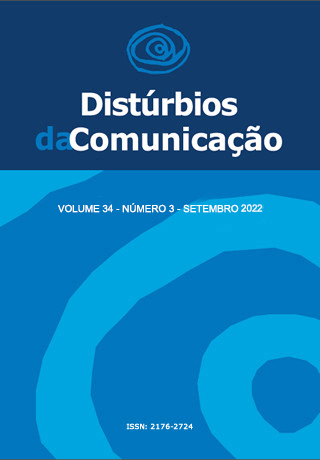Auditory and cognitive aspects in adults with type 2 Diabetes Mellitus
DOI:
https://doi.org/10.23925/2176-2724.2022v34i3e55322Keywords:
Diabetes Mellitus, Speech, Language and Hearing Sciences, Cognition, Hearing, AudiologyAbstract
Introduction: Diabetes Mellitus (DM) is a metabolic disorder caused by the absence or reduction of insulin secretion or by changes in the functioning of this hormone in the body, which may involve physical and cognitive changes. Objective: To analyze the audiological and cognitive aspects of type 2 Diabetes Mellitus in adults. Method: Cross-sectional study carried out in people aged between 18 and 59 years, of both genders. Participants were divided into two groups: Study Group (SG) - people diagnosed with Diabetes Mellitus and the Control Group (CG) - people without Diabetes. All underwent glycemic, cognitive and auditory assessment. Mann-Whitney’s test was used for statistical analysis, with a significance level of 0.05. Results: 32 individuals participated in the study, 19 (59.4%) in the EG and 13 (40.6%) in the CG. The mean age of the participants was 46.8 ± 8.3 years, with a mean education of 6.8 ± 6 years, with 25 (78.1%) females and 7 (21.9%) males. A statistically significant difference was observed between the groups for the score related to attention and calculation, recall and total Mini-Mental State Examination (MMSE) score, with worse performance in the EG. There was no statistically significant difference between the groups regarding the audiological aspects evaluated. Conclusion: Individuals with type 2 Diabetes Mellitus did not present risks for audiological alterations, however they presented a high risk for cognitive alterations. the findings demonstrate that constant speech therapy monitoring is essential to identify changes early.
Downloads
References
Lopes RMF, Nascimento RFL, Wendi GW, Argimon IIL. A diabetes mellitus causa deterioração cognitivo em idosos? Um estudo de revisão. Av. Psicol. Latinoam. 2013; 31(1): 131–9.
Lyra R et al. Sociedade Brasileira de Diabetes. [s.l: s.n.]. v. 5. 2020.
Alvarenga KF, Duarte JL, Silva DPC, Agostinho-Pesse RS, Negrato CA, Costa OA. Potencial cognitivo P300 em indivíduos com diabetes mellitus. Rev. bras. otorrinol. 2005; 71(2): 202–7. https://doi.org/10.1590/S0034-72992005000200014
Almeida-Pititto B, Almada Filho CM, Cendoroglo MS. Déficit cognitivo: mais uma complicação do diabetes melito? Arq. bras. Endocrinol. Metabol. 2008; 52(7): 1076–83. https://doi.org/10.1590/S0004-27302008000700003
Lopes CM, Junior JCSM, Pessoa IA, Wan-Meyl FS, Burbano RMR. Diabetes Mellitus e a Doença de Alzheimer. Arquivos Catarineneses de Medicina. 2018; 47(1): 159–68.
Callisaya ML, Beare R, Moran C, Phan T, Wang W, Srikanth VK. Type 2 diabetes mellitus, brain atrophy and cognitive decline in older people: a longitudinal study. Diabetologia. 2019; 62(3): 448–58. doi: 10.1007/s00125-018-4778-9.
Pucci P. Disfagia e Cognição. [s.l: s.n.] 2019.
Morato E M. Das Relações Entre Linguagem, Cognição E Interação - Algumas Implicações Para O Campo Da Saúde. Linguagem em (Dis)curso. 2016; 16(3): 575–90. https://doi.org/10.1590/1982-4017-160304-0516D
Lent R. Cem Bilhões de Neurônios? 2a ed. [s.l.] Atheneu; 2010.
Cavalcante S, Abrantes AM, Souza AL. Linguagem, discurso e cognição: desafios e perspectivas. Scripta. 2014; 18(34): 11-20.
Costa SS. Audiçäo, comunicaçäo e linguagem: um convite à reflexäo. Rev. HCPA & Fac. Med. Univ. Fed. Rio Gd. do Sul. 1999; 19(2): 147–66.
Boéchat EM. et al. Tratado de Audiologia. 2a ed. [s.l.] Guanabara Koogan; 2015.
Borges MGS, Labanca L, Couto EAB, Guarisco LPC. Correlações entre a avaliação audiológica e a triagem cognitiva em idosos. Rev. CEFAC. 2016; 18(6): 1285–93. https://doi.org/10.1590/1982-021620161865616
Diniz TH, Guida HL. Hearing loss in patients with diabetes mellitus TT - Perdas auditivas em pacientes portadores de diabetes melito. Braz. J. Otorhinolaryngol. 2009; 75(4): 573–78. https://doi.org/10.1590/S1808-86942009000400017
Ferreira JM, Sampaio FMO, Coelho JMS, Almeida NMGS. Perfil audiológico de pacientes com diabetes mellitus tipo II. Rev. Soc. Bras. Fonoaudiol. 2007; 12(4): 292–7. https://doi.org/10.1590/S1516-80342007000400007
Maia CAS, Campos CAH. Diabetes Mellitus como causa de perda auditiva. Rev. Bras. Otorrinolaringol. 2005; 71(2): 208–14. https://doi.org/10.1590/S0034-72992005000200015
Brucki SMD, Nitrini R, Caramelli P, Bertolucci PHF, Okamoto IH. Sugestões para o uso do mini-exame do estado mental no Brasil [Internet]. Arquivos de Neuro-Psiquiatria. 2003 ; 61( 3-B): 777-81. https://doi.org/10.1590/S0004-282X2003000500014
World Health Organization. Prevention of blindness and deafness: Grades of hearing impairment, 2014. Available at: http://www.who.int/pbd/deafness/hearing_impairment_grades/en/. Acessed mar 10, 2020.
Arsa G, Lima L, Almeida SS, Moreira SR, Campbell CSG, Simões HG. Diabetes mellitus tipo 2: Aspectos fisiológicos, genéticos e formas de exercício físico para seu controle. Rev. Bras. Cineantropom. Desempenho Hum. 2009; 11(1): 103–11.
Santos GO, Santos LL, Silva DN, Silva SL. Exercícios Físicos E Diabetes Mellitus: Revisão / Physical Exercises and Diabetes Mellitus: Review. Brazilian Journal of Development. 2021; 7(1): 8837–47. DOI:10.34117/bjdv7n1-599
Silva CA, Lima WC. Efeito Benéfico do Exercício Físico no Controle Metabólico do Diabetes Mellitus Tipo 2 à Curto Prazo. Arq. bras. endocrinol. metab. 2002; 46(5): 550–6. https://doi.org/10.1590/S0004-27302002000500009
Ferreira JM, Sampaio FMO, Coelho JMS, Almeida NMGS. Perfil audiológico de pacientes com diabetes mellitus tipo II. Rev. Soc. Bras. Fonoaudiol. 2007; 12(4): 292–7. https://doi.org/10.1590/S1516-80342007000400007
Bavaresco DV, Ferreira NC, Ceretta LB, Tuon L, Simões PW, Gomes KM et al. Prejuízos cognitivos em Diabetes Mellitus: revisão da literatura. Inova Saúde. 2016; 5(1): 30. https://doi.org/10.18616/is.v5i1.2336
Hassing LB, Hofer SM, Nilsson SE, Berg S, Pedersen NL, McClearn G et al. Comorbid type 2 diabetes mellitus and hypertension exacerbates cognitive decline: Evidence from a longitudinal study. Age Ageing. 2004; 33(4): 355–61. doi: 10.1093/ageing/afh100.
León-Morales LVD, Jáuregui-Renaud K, Garay-Sevilla ME, Hernández-Prado J, Malacara-Hernández JM. Auditory impairment in patients with type 2 diabetes mellitus. Arch. Med. Res. 2005; 36(5): 507–10. doi: 10.1016/j.arcmed.2005.02.002.
Ferreira JM, Câmara MFS, Almeida PC, Neto JB, Silva CAB. Alterações auditivas associadas a complicações e comorbidades no diabetes mellitus tipo 2. Audiology - Communication Research, 2013; 18(4): 250–9.
Ferreira JM, Câmara MFS, Almeida PC, Neto JB, Silva CAB. Características audiológicas de pacientes com diabetes mellitus Tipo 2. Rev. CEFAC, 2016; 18(5): 1050–9. doi: 10.1590/1982-0216201618522415
Mozaffari M, Tajik A, Ariaei N, Ali-Ehyaii F, Behnam H. Diabetes mellitus and sensorineural hearing loss among non-elderly people. East. Mediterr. Health J. 2010; 16(9): 947–52.
Downloads
Published
Issue
Section
License
Copyright (c) 2022 Pablo Jordão Alcântara Cruz, Évora Gaia Carvalho Lima , Josilene Luciene Duarte, Nathália Monteiro Santos, Kelly da Silva, Grace Anne Azevedo Dória, Raphaela Barroso Guedes-Granzotti

This work is licensed under a Creative Commons Attribution 4.0 International License.









